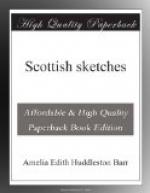She was poisoning her heart with her own tears. When she returned to the “houseplace” and saw the child bending with rapt, earnest face over the books, she could not avoid murmuring that the son of a strange woman should be sitting happy in Cargill spence, and her own dear lad a banished wanderer. She had come to a point when rebellion would be easy for her. Andrew saw a look on her face that amazed and troubled him: and yet when she sat so hopelessly down before the fire, and without fear or apology
“Let the tears downfa’,”
he had no heart to reprove her. Nay, he asked with a very unusual concern, “What’s the matter, Mysie, woman?”
“I want to see Davie, and die, gudeman!”
“You’ll no dare to speak o’ dying, wife, until the Lord gies you occasion; and Davie maun drink as he’s brewed.”
“Nay, gudeman, but you brewed for him; the lad is drinking the cup you mixed wi’ your ain hands.”
“I did my duty by him.”
“He had ower muckle o’ your duty, and ower little o’ your indulgence. If Davie was wrang, ither folk werena right. Every fault has its forefault.”
Andrew looked in amazement at this woman, who for thirty and more years had never before dared to oppose his wishes, and to whom his word had been law.
“Davie’s wrang-doing was weel kent, gude-wife; he hasted to sin like a moth to a candle.”
“It’s weel that our faults arena written i’ our faces.”
“I hae fallen on evil days, Mysie; saxty years syne wives and bairns werena sae contrarie.”
“There was gude and bad then, as now, gudeman.”
Mysie’s face had a dour, determined look that no one had ever seen on it before. Andrew began to feel irritated at her. “What do you want, woman?” he said sternly.
“I want my bairn, Andrew Cargill.”
“Your bairn is i’ some far-awa country, squandering his share o’ Paradise wi’ publicans and sinners.”
“I hope not, I hope not; if it werena for this hope my heart would break;” and then all the barriers that education and habit had built were suddenly overthrown as by an earthquake, and Mysie cried out passionately, “I want my bairn, Andrew Cargill! the bonnie bairn that lay on my bosom, and was dandled on my knees, and sobbed out his sorrows i’ my arms. I want the bairn you were aye girding and grumbling at! that got the rod for this, and the hard word and the black look for that! My bonnie Davie, wha ne’er had a playtime nor a story-book! O gudeman, I want my bairn! I want my bairn!”
The repressed passion and sorrow of ten long years had found an outlet and would not be controlled. Andrew laid down his pipe in amazement and terror, and for a moment he feared his wife had lost her senses. He had a tender heart beneath his stern, grave manner, and his first impulse was just to take the sobbing mother to his breast and promise her all she asked. But he did not do it the first moment, and he could not the second. Yet he did rise and go to her, and in his awkward way try to comfort her. “Dinna greet that way, Mysie, woman,” he said; “if I hae done amiss, I’ll mak amends.”




